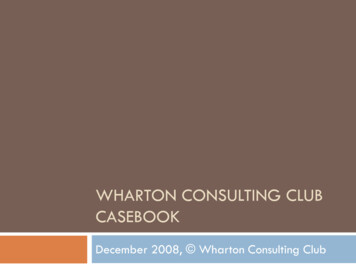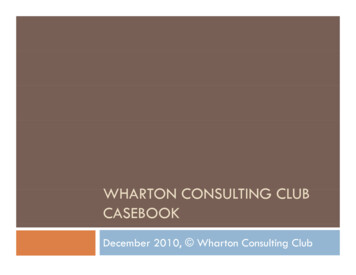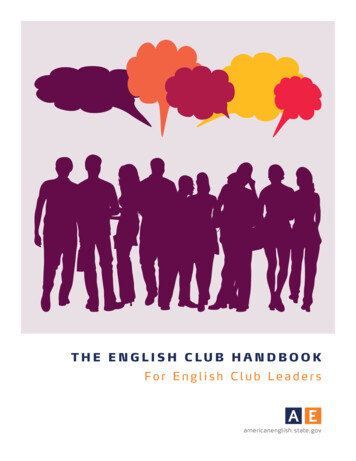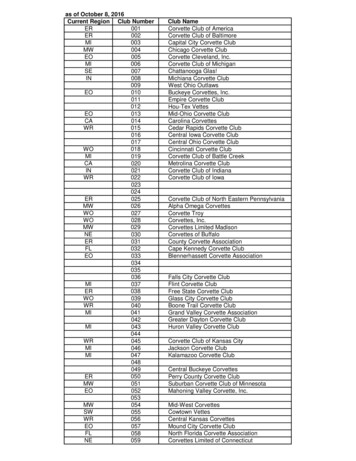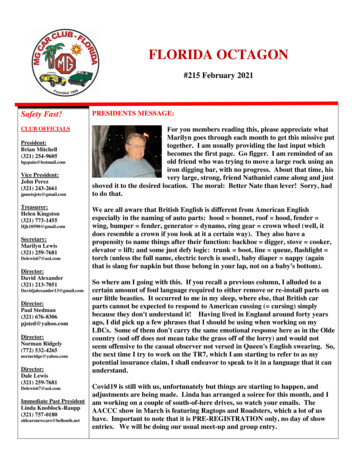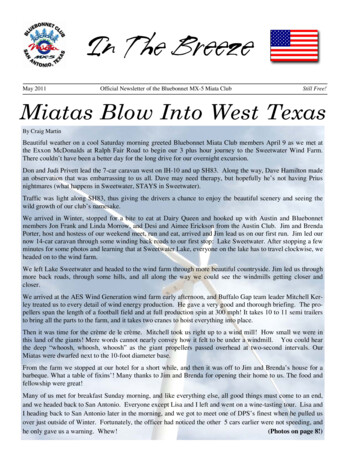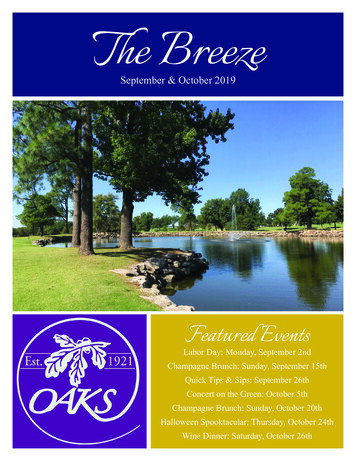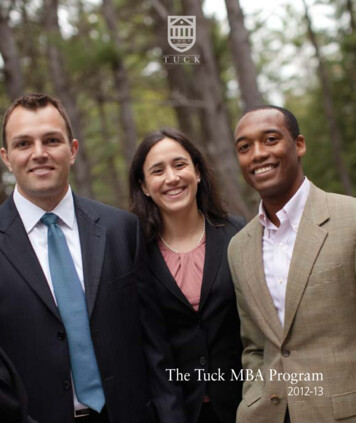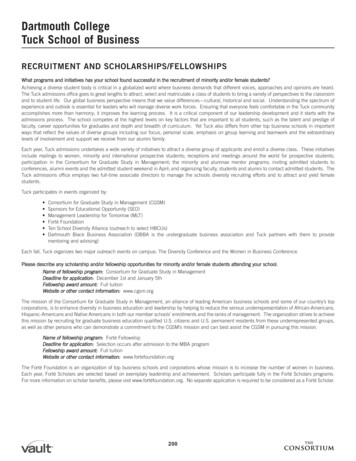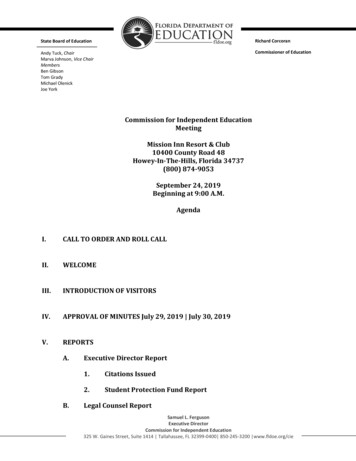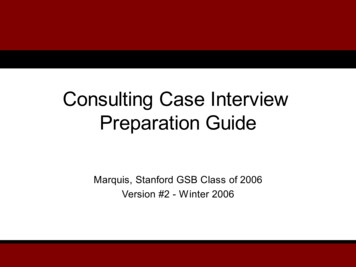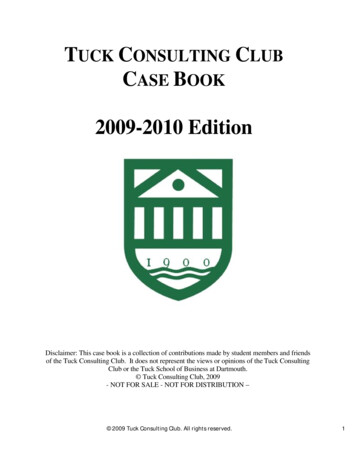
Transcription
TUCK CONSULTING CLUBCASE BOOK2009-2010 EditionDisclaimer: This case book is a collection of contributions made by student members and friendsof the Tuck Consulting Club. It does not represent the views or opinions of the Tuck ConsultingClub or the Tuck School of Business at Dartmouth. Tuck Consulting Club, 2009- NOT FOR SALE - NOT FOR DISTRIBUTION – 2009 Tuck Consulting Club. All rights reserved.1
Table of ContentsINTRODUCTION.4RECRUITING INTELLIGENCE.5Interview process timeline. 5What are the firms looking for? . 7Structure of a case interview (example) . 8How to give a case interview . 8STRATEGIC TOOLS AND FRAMEWORKS.10General Tools for Case Interviews. 10General Strategy. 10Star Model . 10SWOT Analysis . 10Porter’s Five Forces . 11Core Competency Analysis . 11GE / McKinsey Matrix . 12Decision Trees . 12Marketing / Positioning . 13Segmentation . 14Operations / Productivity. 15Value Chain Analysis . 16Vertical Integration. 17Synergies. 17Product/Technology Life Cycle. 17Just-in-Time Production . 18Total Quality Management (TQM) . 18TYPES OF CASES. 18Financial Analysis / Profitability. 18Breakeven Analysis . 20Market Sizing . 22 2009 Tuck Consulting Club. All rights reserved.2
Industry Analysis/Market Entry/Growth Strategy . 24Additional Resources. 27PRACTICE CASES .28 2009 Tuck Consulting Club. All rights reserved.3
INTRODUCTIONThis book provides a brief overview of the case interview process, a few tools to keep in mindwhen preparing for interviews and a collection of practice cases. We hope it is helpful in yourpreparations. Thank you to all our contributors:Elena Bazina T’10Igor Borojevic T’10Sudeep Deshpande T’10Vishnu Srimurthy T’10GOOD LUCK! 2009 Tuck Consulting Club. All rights reserved.4
RECRUITING INTELLIGENCEInterview process timeline1. Over the summerPrepare your resume: Think of succinct ways to describe your mainachievements. Show the skills consultants are looking for: leadership, teamwork, academicexcellence, analytical skills, problem solving, personal achievement and personal impact.Read the newspaper: Use current events to practice breaking down business problems andthinking about how to structure a solution.2. First few weeks at schoolParticipate in resume review: Leverage CDO student fellows, second years and study groupmembers to refine and revise your existing resume.Attend Sector Smarts: Attend panels of recent Tuck alumni who share their experiences. Askquestions and decide what is important to you in your choice of career. Decide whether consultingmeets your objectives.3. SeptemberAttend company briefings: Attend as many briefings as you can in your area of interest. Manyof the firms that recruit at Tuck will come to Hanover to make formal presentations. Thesepresentations are often followed by an informal Q&A period which gives you the chance to meetsome of the firm’s employees. Many of those presenting will be Tuck alumni and may well beinvolved with interviewing later in the process - first impressions matter! Try to learn about theculture of each firm, its values, and why its people believe it’s a great place to work.Talk to second years: The recruiting period can be bewildering, so talk to those that have beenthrough it already. This is the best place to ask questions that you might be embarrassed to askelsewhere.Remember that most second years will not be around after Thanksgiving, soask early and ask often!4. OctoberAttend Crack the Case workshops: These workshops are hosted by second years with prior orinternship experience with management consulting firms. These four in depth workshops, eachbuilding on the previous, are designed to help you perform your best in the case interviewsused by many firms.Consulting Trek: This three-day trip over the October break provides a comparative look at allthe major firms. We visit each firm at their office – this is a critical opportunity. Do not miss it.Establish links with Tuck Alumni: Building relationships at your firms of choice will expressyour interest and help develop you understanding of firms, particularly if you have a stronglocation preferencePractice case interviews: Work with your peers (both friends and other you are not close with)and work by yourself (you don’t need an interviewer to practice structuring a problem or 2009 Tuck Consulting Club. All rights reserved.5
performing “public math”)5. November/DecemberOutreach with other offices: It is critical that you make contacts in several offices of your keyfirms. Speak to Tuck alums there. Get the inside scoop to see which office is best for you andyour background. It may not be Boston or NY, so explore freely. This is overlooked by manycandidates. The firms wish Tuckies applied to a broader geographic spread of offices! Soconsider it and do your due diligence by speaking to people.Apply to firms: Deadlines and methods vary for each firm. If in doubt, ask. Have a back-upplan, it never hurts. Tuck’s policy is that 50% of interview slots are “closed list” positions. A“closed list” position means you were selected by the firm for an interview. If you are not “closedlisted” you can still bid for an interview slot.Practice case interviews: Continue to work with your peers and work by yourself. Some firmsmay visit campus and run sessions to help you prepare for the interviews6. JanuaryRefine technique: Formal second year practice coaching session will be organized with secondyears (and in some visiting firms) This period is very busy and involves a lot of balancing ofschool work and interview preparation. Prioritize your practice.Fit interview prep: Cases are important, but they are not the only factor. Do not neglect preparingyour story. Make sure it is clear, concise and that you can tell it in an engaging manner. The fitcomponent matters, particularly in final rounds. Firms want smart people who are good to workwith. Show them that you meet those criteria.7. FebruaryFormal on campus interviews. First round interviews are typically held on campus. Firm’sinterview practices are similar but key differences do exist. Second round interviews willusually be at the firm’s office. Again, the exact process varies from firm to firm. - Speak withthe CDO if you have any questions.The entire process is well tried and tested. You will get a lot of help but it also requires a concertedeffort on your part to be successful. Don’t underestimate the importance of practicing cases and yourown style! 2009 Tuck Consulting Club. All rights reserved.6
What are the firms looking for?Key success factors associated with each firm will vary, however there are a number commonpoints to remember when compiling your resume, submitting applications, and interviewing. Thesekey success factors are divided into two key areas: 1) case-based skills and 2) experienced basedcharacteristics:Case Based Skills Problem solving skills (dealing with ambiguity): These themes may seem obvious whenconsidering the case interview but are mentioned here for two reasons.First, does your resume show a history of success in this area? Secondly, don’t let yourself getflustered by interviews that don’t follow the typical path. Stick to a logical approach even in lessstructured interviews. Analytical Skills: Your analytical skills are often tested through your ability to structure a problemand its various components. This skill can be learned and refined through practice. It is important tohave structure in your problem solving as you will need to effectively communicate your plan ofaction to tackle the problem. A well designed structure makes this communication easy and will helpyou effectively solve the problem. Do not confuse structure with frameworks (the frameworksprovided in this book will help you think about an appropriate structure but they are seldom used inisolation as a structure to solve the problem). Quantitative skills: Most cases will involve a quantitative component. These math problemstypically involve high school level math. To complicate the experience, you are often not given allrequired information required to solve theproblem. Your setup is equally or more important toyour ability to use solve basic math. Also remember to walk your interviewer through yourcalculations and approach as you complete the problem vs. being a silent calculator. Synthesis skills: Your ability to weave insights together throughout the case and to develop acoherent synthesis (not a summary or travel log) is important in any case interview.Experience based characteristics Personal Achievement: You will be up against a very competitive group of applicantsthat all have similarly impressive academic and professional achievements. Distinguish yourself byshowing that you are successful in your personal life, using examples from outside work/school ifpossible. This will add breadth to your candidacy. Leadership: Discussion of leadership is a common activity at Tuck but it can be hardtoquantify. Some people will have obvious leadership experience but for others, you will need to makesure that leadership elements in past experiences stand out. Practice describing these events in asuccinct and understandable way. Teamwork: Some would call this the “airport test.” Are you someone that the interviewer wantsto work with on a difficult and time consuming case or be stuck in an airport with? The interview isyour chance to show that you fit with the culture of your chosen firm/s. This is a two way process: do 2009 Tuck Consulting Club. All rights reserved.7
they like you and do you like them? The best advice here is to try to relax and be you. There aremany other areas that could be mentioned. Some firms will rate some higher than others. Try tobuild a picture of this as you listen to firm presentations, talk to employees and scour the respectivefirm websites.Structure of a case interview (example)Order1SectionMeet & GreetDuration1-5 minSkillsInter-personalObjectiveUtilize information from theinterviewer bio to make aconnection. Relate to theinterviewerwith similar experiences(from Tuck, if possible)2Receive theQuestionClarify theQuestion1-2 minListening2-3 minFinding dataTake notes. Pick up as much dataas possibleRephrase the Question. Dig a littledeeper with follow-up questionswith general strategy frameworks(e.g. 4P’s/3C’s)4Develop aframework tosolve10-15 minAnalytics, problemsolving and publicmathFrame ProblemWalk the interviewer through thesolution5State theconclusion(synthesis)1-2 minBig Picture thinkingSynthesize findings.State larger considerationsOf the solution (overall impact)3How to give a case interviewYour role as a case interviewer is to present a problem and act as guide for the interviewee. Theinterviewee does most of the work and the best interviewer will stay mostly passive with limiteddirective probing
Your role as a case interviewer is to present a problem and act as guide for the interviewee. The interviewee does most of the work and the best interviewer will stay mostly passive with limited directive probing throughout the process. Here are some interviewer best practices: Prepare: Make sure you have read the case before the practice session. You should understand
